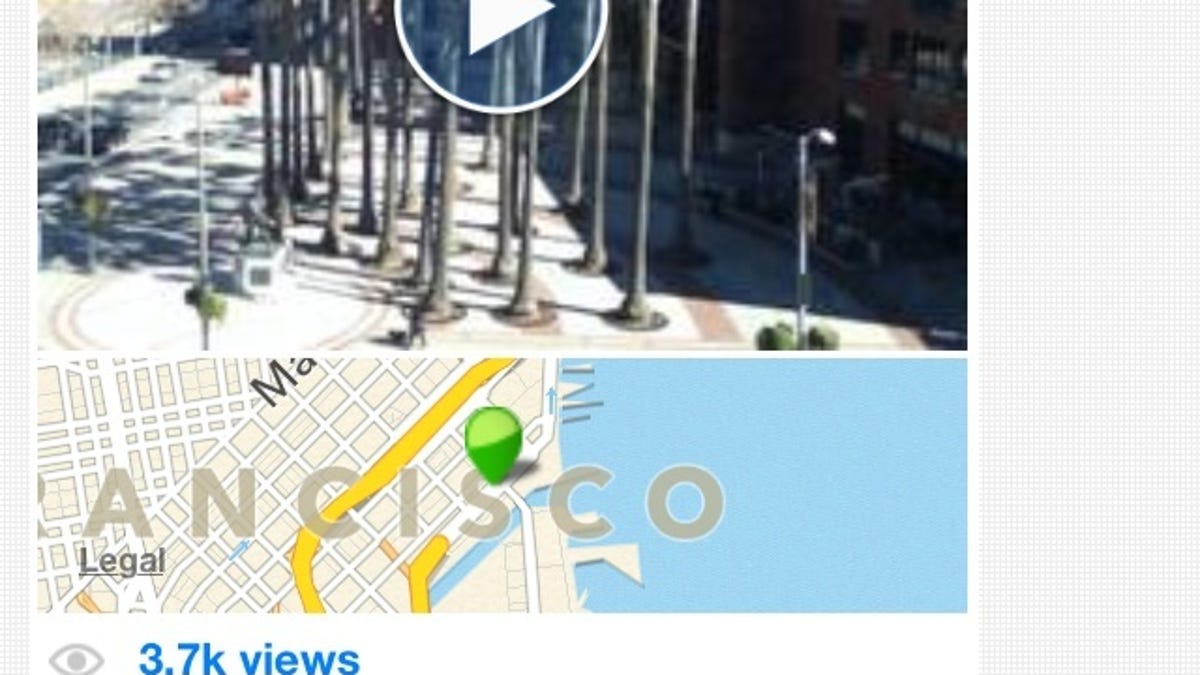Koozoo pitches surveillance for the masses via smartphones
The San Francisco startup envisions a world where a network of smartphone cameras will anticipate your needs and offer streaming video that fills them. But that's future talk. For now, it will just put up cameras anywhere it can.
If Koozoo CEO Drew Sechrist has his way, cameras will record every move you make in public -- and make your life better for it.
The San Francisco startup wants smartphone owners to deploy a network of streaming smartphone cameras that are accessible by anyone within the Koozoo network at any time. The network launches on iOS today in San Francisco and Austin, Texas, with plans to expand in the coming months.
Users can participate by posting recorded snippets -- these are a few minutes long -- to the network or to social media like Facebook and Twitter. Or, they can sign up to provide a 24-hour stream using an old smartphone. Anyone can jump on the network to watch the feeds.
The idea of being watched by complete strangers sounds creepy, but Sechrist said Koozoo is anything but. It's about empowering people, he said.
"Big Brother is your government one way looking down at you, and this is the exact opposite. This is from the ground looking up from a system that people can all benefit from," Sechrist.
The service is free. The company plans to charge for more premium services in the future, like saving footage from lives feeds or adding notifications to alert that you that certain events are happening.
To cut down on abuse on live streaming feeds (and so unsuspected feed viewers don't have gross ChatRoulette-like moments), Koozoo reviews new feeds before they go live and existing feeds when they get flagged. Users can sign up through the app and Koozoo will mail you a suction cup bracket to hang your camera from a window. The cameras will stay in hibernation mode until someone tries to watch to stream.
Still, Sechrist knows that he must tread carefully in the privacy department. Koozoo established an advisory board made up of privacy experts, including someone who knows how complicated an issue like privacy can get: Facebook's former public policy director, Tim Sparapani.
Sparapani, who also used to work for the American Civil Liberties Union, said Koozoo is giving him a "nominal stake" in the company, but that's not what drew him to the company. Sparapani said privacy is baked into the product, down to the terms of service, and that's something that most companies don't think about until they need to.
"You could have built an entirely different system -- 'Oh, we'll just put cameras everywhere' -- and then start stumbling into the problems," Sparapani said. "But, that's not Koozoo." Instead, Koozoo focused on dismissing feeds that can look into people's homes or backyards -- and only showing camera feeds that record in public spaces.
Or, semi-private in some cases. One of the cameras involved with Koozoo's five-month, 100-people beta streams from inside a San Francisco ju-jitsu dojo. The idea is that people can check out the classes before they take them.
Sechrist said this is just one of the ways that Koozoo can be useful. Other streams let people check out the weather at the beach, see if there's a long line at their favorite cafe, or see where there are traffic jams in the city.
Koozoo's utility, Sechrist argues, is what sets the product apart in the crowded social-video arena, which includes companies like YouTube and the more recent sensation, Twitter's Vine.
Sparapani takes it a step further. He sees Koozoo turning the tables on government, capturing how police act during protests in San Francisco or during a citizen uprising in the Middle East. "Instead of creating a privacy monster, we might be able to create something with enormous social benefit," he said.
Eventually, Sechrist hopes, Koozoo will use its mix of computer vision, artificial intelligence, and machine learning to figure out what want you want to see, even before you know it. This means harnessing data like car accident reports on streets you regularly use for your daily commute, or keeping track of which feed you check on a regular basis.
"In the not-too-distant future, Koozoo will be able to do the looking on your behalf," Sechrist said. "Koozoo will know the things you're interested in looking at, what your parking preferences are, where you commute, where you get your latte or morning bun."
A powerful thought, but for now, it's not a reality. Until that's possible, checking out Koozoo may give you a weather report, the short line to your pastry, and a good stream for viewing the Bay Lights project.


